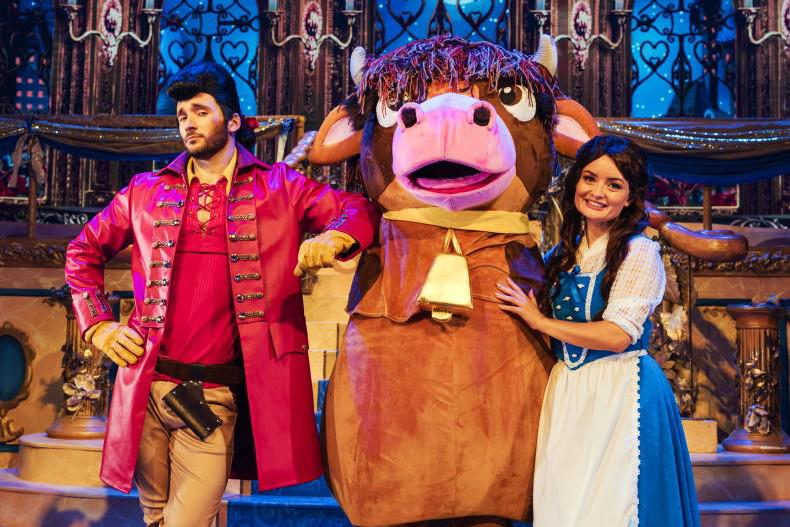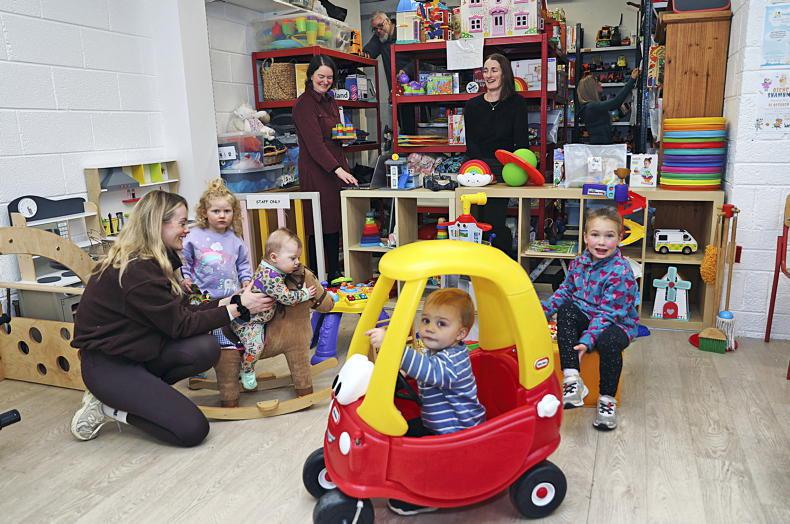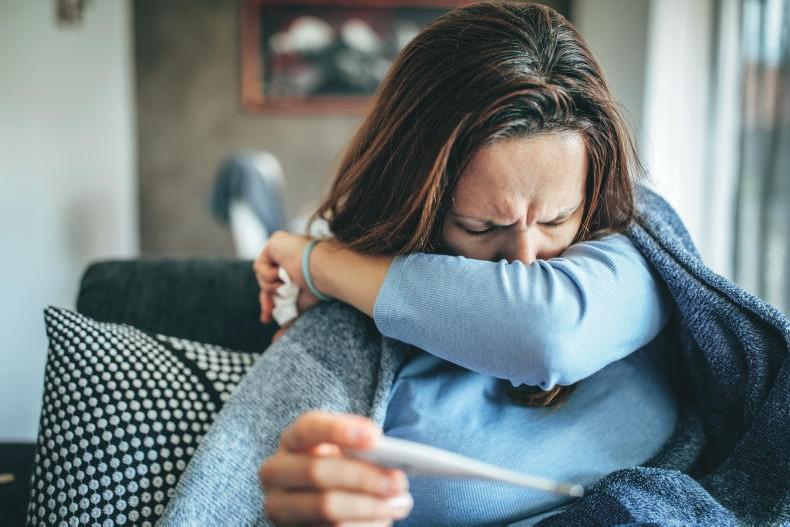We’ve always had a high uptake of vaccines in Ireland and we’ve seen such a large decrease in some very infectious diseases because of this,” says Dr Lucy Jessop, consultant physician in public health medicine and the HSE’s national immunisation lead.
“During COVID [lockdowns], uptake did decrease a bit for various reasons, including accessibility to GPs, nervousness about going into healthcare settings and schools being closed. It was really difficult for everyone and we probably have built up a small amount of children that are not as well protected as they would have been previously, so we want to remind parents that it is back into a ‘business as usual’ time now. As we face into the new term, it’s so important to avail of the vaccinations given in schools.”
Measles are a concern
Primary school children getting their MMR booster vaccine in junior infants is particularly important this year, she says.
This protects a child from measles, mumps and rubella.
“There are quite a lot of measles [cases] in Europe and in the UK; they’ve started a ‘catch up’ campaign in London because they know they have quite a lot of susceptible children there who haven’t had their MMR vaccine, so they are worried about outbreaks,” she says.
“In Ireland we would be a little concerned about people coming back from holidays in Europe and the UK and maybe potentially bringing those diseases back.”
She points out that measles can be a very serious disease – and very infectious.
“Measles is the most infectious disease we have,” she says, “and we know that one case could infect 12-18 non-immunised people.
“Early symptoms can include fever, rash and loss of appetite but it can go on to cause inflammation of the brain [encephalitis] and pneumonia, and it can be fatal. There was an outbreak in Dublin in 2000, for example, and several children died, so it isn’t that long ago that children have died in Ireland from measles.”
Getting the MMR vaccine is the best way to prevent it and protect your child, she reiterates.
Two doses of MMR vaccine are required to give the best protection (given at the age of 12 months and again at age four or five).
There have been no confirmed cases of measles reported in Ireland to date in 2023, she states, but it is a notifiable disease in Ireland so suspected cases will continue to be monitored.
“If any child has missed their MMR vaccine, they should be vaccinated as soon as possible. If they are not sure, they can check with their doctor.”
For more information about the MMR vaccine, you can visit hse.ie/eng/health/immunisation/pubinfo/pcischedule/vpds/mmr/
Junior infants
Dr Jessop reminds parents that children starting primary school are offered a second MMR jab to protect against measles, mumps and rubella and also a 4 in 1 (diptheria, tetanus, whooping cough and polio) vaccination during their junior infants year.
First year students in secondary school
The schools programme also provides a vaccination for first-year students in secondary school. This is for the HPV9, plus MenACWY, plus Tdap injections.
HPV9 is the human papillomavirus vaccine, MenACWY is the meningococcal A,C,W,Y conjugate vaccine and Tdap is the tetanus, low-dose diphtheria and low-dose whooping cough vaccine.
“For junior infants, those vaccinations would carry the children through. For MMR, that would be all they need – the two doses – but with the tetanus booster, they get another dose when they are in first year of second level school along with the meningococcal ACWY non-live vaccine. That protects against potentially life-threatening meningitis and septicaemia [blood poisoning].”
HPV
HPV stands for “human papillomavirus”, which is a group of more than 100 viruses.
“HPV is very common – most people will be infected with a form of HPV in their lifetime,” Dr Jessop says. “HPV infection is most common in people in their late teens and early 20s. You can catch HPV by being sexually active with another person who already has the virus. Most HPV infections do not need treatment because your body can clear the virus itself, but in some people, the HPV infection can develop into cancer or genital warts.
“The HPV vaccine protects against almost all cases of cervical cancer, seven out of 10 vaginal and five out of 10 vulval cancers, nine out of 10 HPV related anal cancers and nine out of 10 cases of genital warts.”
Only one dose of HPV vaccine is now recommended, unless the young person is immunocompromised. In that case, they require three doses.
“These vaccines are also available to students who are in special schools or are home-schooled in the same age group,” she adds.
Watch out for the consent forms
Vaccinations in schools are run by the HSE’s schools’ immunisation teams in all counties bar Donegal, Sligo and Leitrim, where they are offered by GPs for junior infants.
Parents of junior infants and first- year secondary school students are asked to watch out for the immunisation consent packs that their child will be bringing home from school.
“We would urge parents to return these consent forms, completed and signed, to the school, as soon as possible.”
In Ireland, all the recommended childhood or adolescent vaccines when administered in the schools’ immunisation programme are free.
Information about the school immunisation programme can be found here: hse.ie/eng/health/immunisation/pubinfo/schoolprog/
Read more
Supporting children who are self-harming
Health: autism dog making a big difference to a Leitrim family
We’ve always had a high uptake of vaccines in Ireland and we’ve seen such a large decrease in some very infectious diseases because of this,” says Dr Lucy Jessop, consultant physician in public health medicine and the HSE’s national immunisation lead.
“During COVID [lockdowns], uptake did decrease a bit for various reasons, including accessibility to GPs, nervousness about going into healthcare settings and schools being closed. It was really difficult for everyone and we probably have built up a small amount of children that are not as well protected as they would have been previously, so we want to remind parents that it is back into a ‘business as usual’ time now. As we face into the new term, it’s so important to avail of the vaccinations given in schools.”
Measles are a concern
Primary school children getting their MMR booster vaccine in junior infants is particularly important this year, she says.
This protects a child from measles, mumps and rubella.
“There are quite a lot of measles [cases] in Europe and in the UK; they’ve started a ‘catch up’ campaign in London because they know they have quite a lot of susceptible children there who haven’t had their MMR vaccine, so they are worried about outbreaks,” she says.
“In Ireland we would be a little concerned about people coming back from holidays in Europe and the UK and maybe potentially bringing those diseases back.”
She points out that measles can be a very serious disease – and very infectious.
“Measles is the most infectious disease we have,” she says, “and we know that one case could infect 12-18 non-immunised people.
“Early symptoms can include fever, rash and loss of appetite but it can go on to cause inflammation of the brain [encephalitis] and pneumonia, and it can be fatal. There was an outbreak in Dublin in 2000, for example, and several children died, so it isn’t that long ago that children have died in Ireland from measles.”
Getting the MMR vaccine is the best way to prevent it and protect your child, she reiterates.
Two doses of MMR vaccine are required to give the best protection (given at the age of 12 months and again at age four or five).
There have been no confirmed cases of measles reported in Ireland to date in 2023, she states, but it is a notifiable disease in Ireland so suspected cases will continue to be monitored.
“If any child has missed their MMR vaccine, they should be vaccinated as soon as possible. If they are not sure, they can check with their doctor.”
For more information about the MMR vaccine, you can visit hse.ie/eng/health/immunisation/pubinfo/pcischedule/vpds/mmr/
Junior infants
Dr Jessop reminds parents that children starting primary school are offered a second MMR jab to protect against measles, mumps and rubella and also a 4 in 1 (diptheria, tetanus, whooping cough and polio) vaccination during their junior infants year.
First year students in secondary school
The schools programme also provides a vaccination for first-year students in secondary school. This is for the HPV9, plus MenACWY, plus Tdap injections.
HPV9 is the human papillomavirus vaccine, MenACWY is the meningococcal A,C,W,Y conjugate vaccine and Tdap is the tetanus, low-dose diphtheria and low-dose whooping cough vaccine.
“For junior infants, those vaccinations would carry the children through. For MMR, that would be all they need – the two doses – but with the tetanus booster, they get another dose when they are in first year of second level school along with the meningococcal ACWY non-live vaccine. That protects against potentially life-threatening meningitis and septicaemia [blood poisoning].”
HPV
HPV stands for “human papillomavirus”, which is a group of more than 100 viruses.
“HPV is very common – most people will be infected with a form of HPV in their lifetime,” Dr Jessop says. “HPV infection is most common in people in their late teens and early 20s. You can catch HPV by being sexually active with another person who already has the virus. Most HPV infections do not need treatment because your body can clear the virus itself, but in some people, the HPV infection can develop into cancer or genital warts.
“The HPV vaccine protects against almost all cases of cervical cancer, seven out of 10 vaginal and five out of 10 vulval cancers, nine out of 10 HPV related anal cancers and nine out of 10 cases of genital warts.”
Only one dose of HPV vaccine is now recommended, unless the young person is immunocompromised. In that case, they require three doses.
“These vaccines are also available to students who are in special schools or are home-schooled in the same age group,” she adds.
Watch out for the consent forms
Vaccinations in schools are run by the HSE’s schools’ immunisation teams in all counties bar Donegal, Sligo and Leitrim, where they are offered by GPs for junior infants.
Parents of junior infants and first- year secondary school students are asked to watch out for the immunisation consent packs that their child will be bringing home from school.
“We would urge parents to return these consent forms, completed and signed, to the school, as soon as possible.”
In Ireland, all the recommended childhood or adolescent vaccines when administered in the schools’ immunisation programme are free.
Information about the school immunisation programme can be found here: hse.ie/eng/health/immunisation/pubinfo/schoolprog/
Read more
Supporting children who are self-harming
Health: autism dog making a big difference to a Leitrim family









SHARING OPTIONS